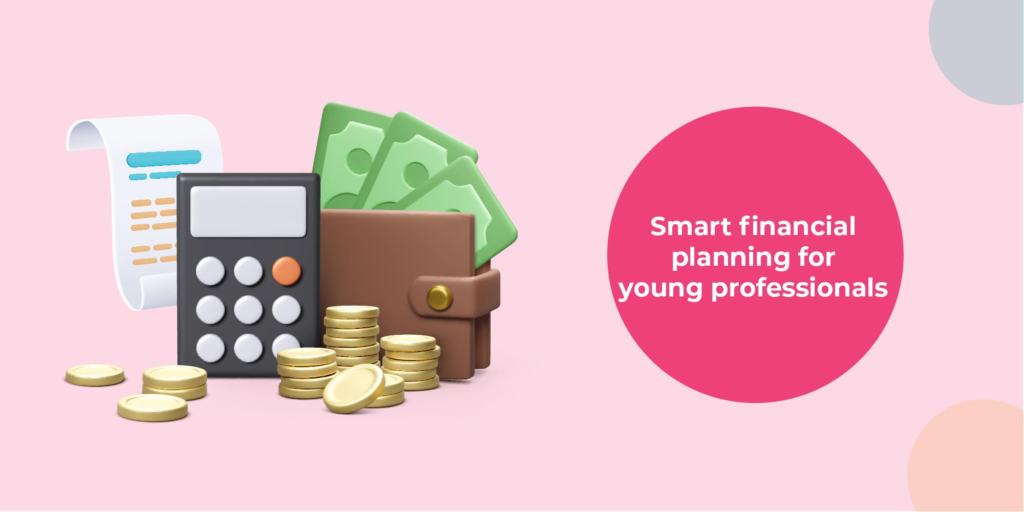As a young professional, you’re at a unique stage in life. You’re likely earning a steady income for the first time, facing new expenses, and perhaps dealing with student loans. While retirement may seem far off, the financial decisions you make now can significantly impact your future. This guide on Financial Planning for Young Professionals will help you navigate the world of personal finance and set you on the path to financial success.
Understanding Your Financial Situation
The first step in any financial plan is to get a clear picture of where you stand. This involves:
a) Calculating Your Net Worth List all your assets (savings, investments, property) and subtract your liabilities (debts, loans). This gives you your net worth, which is a snapshot of your financial health.

b) Tracking Your Income and Expenses For at least a month, track every dollar you earn and spend. This will give you insights into your spending habits and help identify areas where you can cut back.
c) Checking Your Credit Score Your credit score affects your ability to get loans, credit cards, and even rent an apartment. Check it regularly and work on improving it if necessary.
Setting Financial Goals
With a clear understanding of your financial situation, you can start setting goals. These might include:
- Paying off student loans
- Saving for a down payment on a house
- Building an emergency fund
- Saving for retirement
Make your goals SMART: Specific, Measurable, Achievable, Relevant, and Time-bound. For example, “Save $10,000 for a down payment on a house in two years” is a SMART goal.
Creating a Budget
A budget is a crucial tool for managing your finances. Here’s how to create one:
a) List Your Income: Include your salary and any other sources of income.
b) List Your Fixed Expenses: These are regular, predictable expenses like rent, utilities, and loan payments.
c) List Your Variable Expenses: These change month to month, like groceries, entertainment, and clothing.
d) Allocate Your Income: Use the 50/30/20 rule as a starting point. Allocate 50% of your income to needs, 30% to wants, and 20% to savings and debt repayment.
e) Track and Adjust: Regularly review your budget and adjust as needed.

Building an Emergency Fund
An emergency fund is your financial safety net. Aim to save 3-6 months of living expenses in a easily accessible savings account. Start small if you need to – even $500 can make a difference in an emergency.
Tackling Debt
If you have debt, especially high-interest debt like credit card balances, prioritize paying it off. Here are two popular strategies:
a) Debt Avalanche: Focus on paying off the debt with the highest interest rate first while making minimum payments on others.
b) Debt Snowball: Pay off the smallest debt first for psychological wins, then move to the next smallest.
Remember, while paying off debt, continue to make minimum payments on all debts to avoid penalties and fees.
Saving for Retirement
It may seem early, but the power of compound interest means that starting to save for retirement in your 20s or early 30s can make a huge difference. Here’s how to start:
a) Take Advantage of Employer-Sponsored Plans: If your employer offers a 401(k) plan, especially with matching contributions, contribute at least enough to get the full match. It’s essentially free money.
b) Open an IRA: If you’ve maxed out your 401(k) or your employer doesn’t offer one, consider opening an Individual Retirement Account (IRA).

c) Understand Your Options: Learn about the differences between traditional and Roth accounts. Roth accounts can be particularly beneficial for young professionals who expect their income (and tax rate) to increase over time.
Investing Basics
Investing can help your money grow faster than saving alone. As a young professional, you have time on your side to weather market fluctuations. Here are some investing basics:
a) Understand Risk Tolerance: This is your ability to endure the ups and downs of the market without panicking.
b) Diversify: Don’t put all your eggs in one basket. Spread your investments across different asset classes, industries, and geographic regions.
c) Consider Index Funds: These low-cost funds that track market indexes can be a great way for beginners to start investing.
d) Start Small: You don’t need a lot of money to start investing. Many platforms allow you to start with just a few dollars.
Insurance: Protecting Your Financial Future
Insurance is a crucial part of financial planning. Here are the types of insurance to consider:
a) Health Insurance: This is essential. If your employer doesn’t offer it, look into marketplace options.
b) Disability Insurance: This protects your income if you’re unable to work due to illness or injury.
c) Renters/Homeowners Insurance: Protects your property and belongings.
d) Life Insurance: If you have dependents, life insurance ensures they’re taken care of if something happens to you.

Planning for Big Purchases
Whether it’s buying a home, a car, or planning a wedding, big purchases require careful planning. Here’s how to approach them:
a) Set a Realistic Timeline: Give yourself enough time to save.
b) Research Costs: Understand all the costs involved, not just the sticker price.
c) Save Aggressively: Cut back on discretionary spending to boost your savings rate.
d) Consider the Long-Term Impact: How will this purchase affect your other financial goals?
Continuing Financial Education
The world of finance is always changing. Stay informed by:
- Reading personal finance books and blogs
- Following reputable financial news sources
- Considering working with a financial advisor for personalized advice
Balancing Present and Future
While it’s important to plan for the future, don’t forget to enjoy the present. Budget for experiences and things that bring you joy now, while still saving for the future.
Dealing with Lifestyle Inflation
As your income increases, resist the urge to increase your spending proportionally. Instead, use raises and bonuses to boost your savings and investments.
Side Hustles and Passive Income
Consider ways to increase your income through side hustles or building passive income streams. This extra income can accelerate your progress towards financial goals.
Tax Planning
Understanding basic tax principles can help you keep more of your hard-earned money. Consider:
- Maximizing tax-advantaged accounts like 401(k)s and IRAs
- Understanding which expenses are tax-deductible
- Keeping good records for tax season

Estate Planning
While it may seem premature, basic estate planning is important even for young professionals. This includes:
- Creating a will
- Designating beneficiaries on your accounts
- Considering a healthcare proxy and power of attorney
Navigating Financial Relationships
If you’re in a relationship, have open and honest conversations about money. Discuss your financial goals, spending habits, and how you’ll manage money together.
Staying Flexible
Your financial plan should be a living document. Review it regularly and be prepared to adjust as your life circumstances change.
Building Your Financial Future
Financial planning as a young professional sets the foundation for your future financial success. By understanding your current situation, setting clear goals, and implementing smart financial strategies, you’re taking control of your financial future.
Remember, personal finance is personal. What works for someone else might not work for you. The key is to start now, be consistent, and adjust your plan as needed. Don’t be discouraged if you can’t do everything at once – every step you take towards better financial health is a step in the right direction.

Most importantly, view financial planning as a tool to help you live the life you want, both now and in the future. By making smart financial decisions early in your career, you’re giving yourself more options and freedom down the road.
Whether your dreams include traveling the world, starting your own business, or retiring early, a solid financial plan can help you get there. So start today – your future self will thank you!
You might also be interested in – Jio Financial Services has received RBI approval to operate as a core investment company.